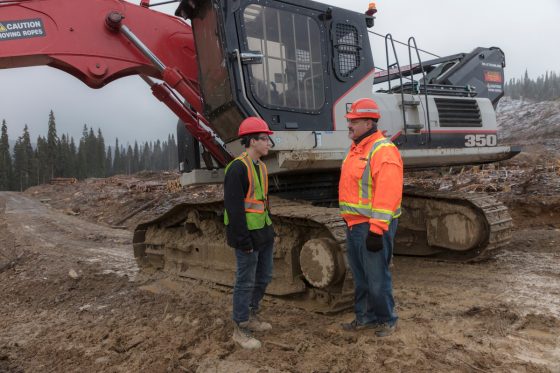Learn how parents of young workers can find information and talk with their child about safety at work and COVID-19 safety protocols.

Photo credit: © WorkSafeBC (Workers’ Compensation Board
of B.C.), used with permission
Training and orientation are an important part of starting any new job. This is especially true during the COVID-19 pandemic, when workers have additional procedures to learn that help prevent spreading or contracting the virus. As parents or mentors, you can support your young workers by starting a conversation around safety at work and asking questions about the training they’ve received.
Young workers (under age 25) are injured more often than older or more experienced workers. Some reasons for this include their limited work experience, hesitancy to ask questions, and receiving inadequate orientation, training, and supervision. (Read more on WorkSafeBC’s Young and new workers webpage.)
I asked Brenda Lavalle, a WorkSafeBC occupational safety officer, how young workers can be prepared for their first day at a new job during the pandemic. She says it’s important they know how to communicate with their managers and other staff. For example, they should know what to do if a customer or co-worker isn’t following COVID-19 safety protocols. Do they know they have the right to refuse unsafe work?
“Young workers need to know how to talk with employers about any concerns, even if employers are focused elsewhere or seem stressed,” Brenda says. “One way to approach their manager could be to offer to help and be part of the solution.”
Setting the stage for knowledge
Brenda suggests that young workers and their parents or mentors look at online resources together. Maybe family members could take turns finding and reading answers to questions they have about safe work practices, or they could do presentations about safety for one another.
When it comes to COVID-19, a good place to start finding information is WorkSafeBC’s online COVID-19 information and resources. The resources offer information on how to keep physical distance, practice proper hygiene, disinfect surfaces, and use personal protective equipment (PPE), all things that might be part of an employer’s COVID-19 Safety Plan. Being familiar with this information ahead of time may make it easier once the young worker is on the job.
Brenda has talked with many young workers during her career. She’s done presentations in schools and worked with Skills Canada projects for students in Grades 11 and 12. She also makes a point of including new and young workers during worksite inspections. “The reward of working with young workers is seeing the lights come on in them,” Brenda says. “Knowledge is power.”
Supporting mental health and resilience
It’s also helpful to understand how to support young workers experiencing virus-related anxiety and stress. We need to ensure they know they aren’t alone in their struggles. This article from the Canadian Mental Health Association suggests ways to support the mental health and resilience of workers as the pandemic continues. Also, read my post Need help dealing with mental health effects of COVID-19?
It’s an employer’s responsibility to provide training. But as a parent or mentor, you can encourage your young worker to stay healthy and safe on the job by talking to them about their workplace rights and responsibilities.


